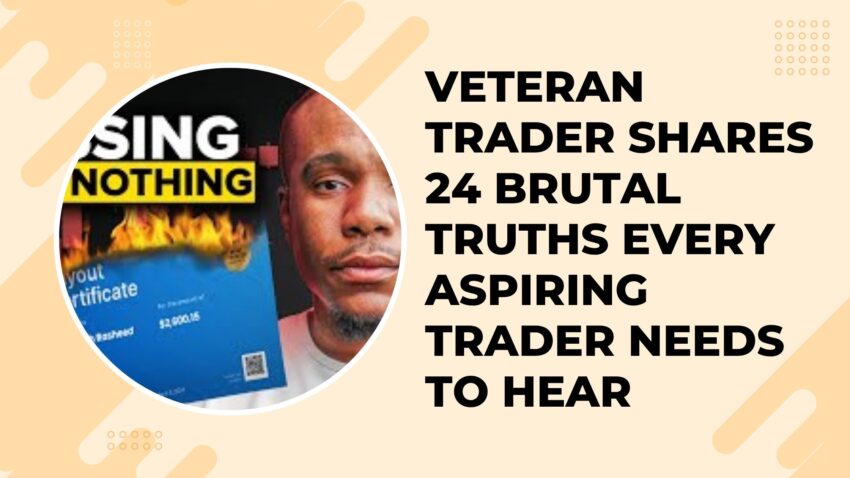A seasoned trader with over six years of experience in forex, futures, stocks, and crypto has outlined 24 crucial truths every trader should know before seeking consistent profitability. From prop firm payouts to coaching beginners, the trader—whose identity remains anonymous—draws on real losses, hard-earned wisdom, and thousands of hours in the market.
“If I could pull my rookie self aside and hand him the shortcut to consistent profits, here’s exactly what I’d say,” the trader began, setting the tone for the brutally honest advice that followed.
Trading is a Profession, Not a Side Hustle
One of the earliest lessons he shared is about mindset. “When I first started, I thought trading was easy. I treated it like a weekend hobby,” he recalled. But trading, he argued, is more akin to being a professional athlete or surgeon—it demands education, structure, and relentless discipline. “You never enter a cockpit or an operating room after skimming a few clips online. It’s the same here.”
He advised beginners to start with real education, vetted courses, and to rack up hundreds of trades in a simulator before risking any real capital. “I lost $5,000 in the beginning because I skipped that process.”
Signal Services Won’t Make You Profitable
Another strong opinion centered around copy-trading and alert services: “Most of those don’t work. I lost my first 5K trying to follow signals.” According to him, real profits come from understanding why a trade works—not parroting someone else’s entries.
Strategy, Journaling, and Market Cycles
The trader emphasized logging trades, tracking emotional states, and proving a strategy through 50–100 small or demo trades before scaling up. “When I first got my big win streak trading indices in a downtrend, I thought I made it. Then the market went sideways for three weeks, and I gave it all back.”
Good record-keeping was framed as vital to survival. “I wish I had documented every trade from day one. Good records keep you alive.”
Managing Noise, Risk, and Expectations
Several truths dealt with psychology and expectations. “Not every candle tells a story. Sometimes it’s just noise,” he said, advising traders to step aside when volume dries up or price action becomes choppy.
On risk: “Don’t just use percentages. Use a dollar amount you can emotionally lose. When I went back to dollar-based risk, my discipline improved.”
Find What Fits and Think Long-Term
The trader stressed the importance of aligning trading style with lifestyle. “Scalping, day trading, swing trading—they all work. But the right one is the one you can stick with.”
He encouraged traders to build a 10-year career plan, not chase daily wins. “A bad Tuesday feels small when you zoom out,” he said.
Community, Mentorship, and Broker Choice
He also recommended finding a trading community for accountability and seeking mentorship early. “Find a mentor, then surpass them. That shortcut will save you years.”
He warned traders to choose brokers wisely, noting that some profit when their clients lose. “Ask yourself: does this broker win when I win? If not, be cautious.”
Price Action, News, and Fundamentals
Though often debated, he pointed out the impact of news on price. “Headlines move prices. Earnings reports, drug approvals, geopolitical events—ignoring them can get you blindsided.”
He recalled learning from professional traders that awareness of fundamentals separates amateurs from pros.
Discipline and Growth After Setbacks
Perhaps the most empowering message came near the end. “Discipline can rebuild any account. I lost 5K, then 10K. Everything I lost, I’ve regained. Repeating the mistake is ego. Fixing it is growth.”
He urged traders to draft a playbook, test it, and follow a proven pipeline of simulation before live scaling. “Shortcuts cost more than they save.”
Final Word: Learn and Apply
The trader closed by recommending a list of books, including One Good Trade, The Playbook, and The Best Loser Wins. “Most of what I do isn’t revolutionary,” he said. “It’s just mastery of basics and repetition.”
His message: “If you’re serious about trading, be ready for slow, consistent growth. Master one percent a day. That’s how you win.”




